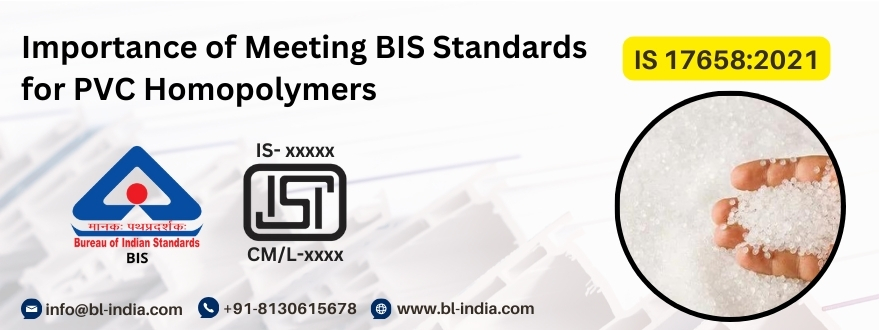
PVC homopolymers, also known as polyvinyl chloride homopolymers, are a type of thermoplastic polymer widely used in various industries due to their versatility, durability, and cost-effectiveness. These polymers play a vital role in applications ranging from construction materials to healthcare products.
These homopolymers find their place in a myriad of products and sectors, from construction materials such as pipes, window profiles, and flooring to everyday items like packaging films, medical devices, and automotive components. Their adaptability, coupled with favourable mechanical properties and chemical resistance, has cemented PVC homopolymers as cornerstone materials in countless industrial and consumer goods.
Importing PVC homopolymers into India requires adherence to specific quality and safety standards established by the Bureau of Indian Standards (BIS). In this blog, we will discover why complying with BIS Certification matters for the import of PVC homopolymers in India.
The Bureau of Indian Standards plays a pivotal role in India's industrial ecosystem as the national standards body. Established under the Bureau of Indian Standards Act, 1986, BIS operates under the aegis of the Ministry of Consumer Affairs, Food and Public Distribution, Government of India.
Its primary objective is to formulate standards and certify products across various industries, ensuring their quality, safety, and reliability. BIS certification, previously known as the Indian Standard Institution (ISI) certification, issues various Indian Standards for specific products.
These standards define specifications for several products, encompassing raw materials, finished goods, and manufacturing processes. The ISI mark, a symbol of conformity to Indian standards, is affixed to products that have undergone rigorous testing and evaluation according to the relevant standard.
This mark serves as a visual cue to consumers, assuring them of the product's adherence to established quality and safety standards. BIS certification serves multiple purposes within India's industrial landscape.
The Ministry of Chemicals and Fertilizers has implemented the Poly Vinyl Chloride (PVC) Homopolymers (Quality Control) Order, 2024, to ensure that all products or articles made from Poly Vinyl Chloride adhere to the applicable IS 17658:2021 standards. The BIS certificate is a crucial requirement for the manufacturers of PVC homopolymers under IS 17658:2021 to ensure compliance with specific quality and safety standards mandated by the Bureau of Indian Standards. IS 17658:2021 is the Indian Standard specification for PVC homopolymers, outlining the requirements and specifications that PVC homopolymers must meet to be deemed safe and suitable for use in various applications.
By obtaining BIS certification for PVC homopolymers, their manufacturers and importers demonstrate adherence to the stringent quality parameters set by Indian regulatory authorities. This certification serves as a mark of quality assurance, indicating that their products meet the prescribed standards for physical properties, chemical composition, and performance characteristics as outlined in IS 17658:2021.
BIS Certificate is mandatory for certain products, including PVC homopolymers, intended for sale or import in the Indian market. Without this certificate, manufacturers of PVC homopolymers will not be permitted to import these products into India or may face legal penalties, including fines and import restrictions.
The function of IS 17658:2021 for PVC Homopolymers is to establish a comprehensive set of guidelines involving the manufacturing, chemical, and physical requirements, as well as testing protocols, necessary for ensuring the quality and safety of Polyvinyl Chloride (PVC) Homopolymers.
This standard is a crucial reference point for manufacturers, regulators, and other stakeholders involved in the production, distribution, and utilization of PVC homopolymers, ensuring adherence to prescribed standards and fostering consistency and reliability in product performance.
IS 17658:2021 delineates specific quality parameters or characteristics that PVC Homopolymers must meet:
These parameters serve as benchmarks for assessing the quality, integrity, and suitability of PVC homopolymers for various applications, ensuring compliance with safety standards and regulatory requirements.
By specifying requirements related to manufacturing processes, chemical composition, and physical properties, IS 17658:2021 aims to uphold the quality, reliability, and safety of PVC homopolymers throughout their lifecycle, from production to consumption. Adherence to this standard facilitates transparency and accountability within the industry, fostering consumer trust and confidence in the integrity of PVC homopolymer products.
Under IS 17658:2021, several tests are necessary to evaluate the quality and performance of PVC homopolymers. These tests include:
The application procedure to obtain BIS license for PVC homopolymers involves several steps, which are outlined below:
Step 1: The first step is to register on the BIS portal (www.bis.gov.in) as an applicant.
Step 2: Once registered, applicants need to submit an online application for BIS certification for PVC homopolymers.
Step 3: After submitting the application, BIS conducts a thorough verification of the submitted documents to ensure completeness and accuracy.
Step 4: BIS may require samples of PVC homopolymers to undergo testing in BIS-approved laboratories to verify compliance with relevant Indian standards, including IS 17658:2021.
Step 5: BIS may also conduct an inspection of the manufacturing facility where the PVC homopolymers are produced.
Step 6: If the PVC homopolymers meet all the requirements and pass the necessary tests and inspections, BIS grants a license for the product.
BIS license indicates that the PVC homopolymers comply with Indian standards and are eligible for importation and sale in the Indian market.
When applying for BIS license for PVC homopolymers, several important documents are required:
The importance of complying with BIS certification for importing PVC homopolymers in India cannot be overstated. Ensuring adherence to BIS standards is not only a legal requirement but also a critical step in guaranteeing the quality, safety, and reliability of PVC homopolymers in the Indian market.
At Brand Liaison, we recognize the significance of BIS certification for businesses seeking to enter the Indian market with PVC homopolymers. As a leading provider of support and assistance in obtaining BIS certification, we offer comprehensive services designed to streamline the certification process and ensure compliance with all regulatory requirements.
Our goal is to empower businesses to navigate the complexities of BIS certification seamlessly, enabling them to access the vast opportunities offered by the Indian market while upholding the highest standards of quality and compliance.